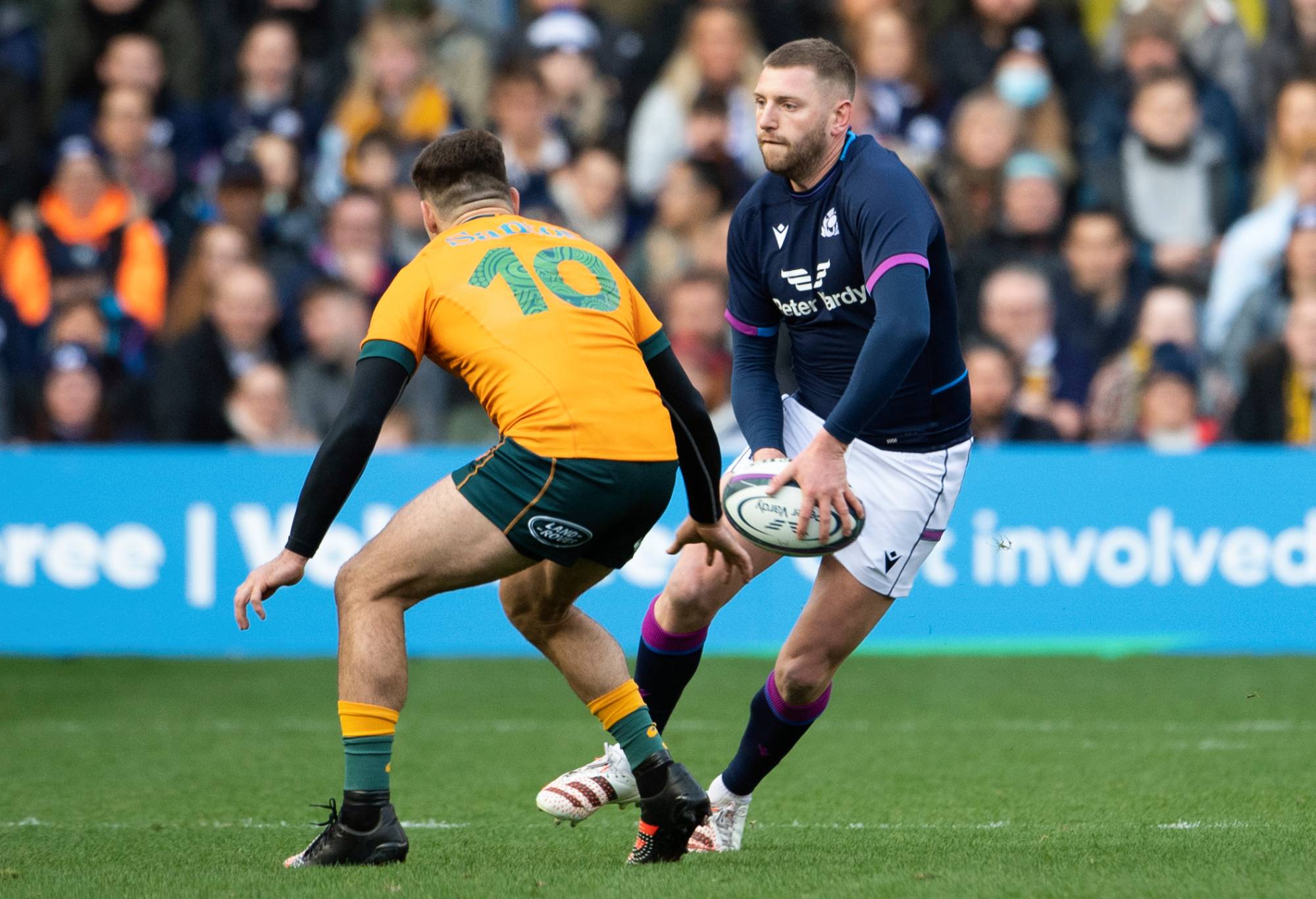Scotland would be full of people if the cold wet sand and lashing winds on the grey sea were a bit less wild and more conducive to supply chains.
In 1700 there were about a million Scots. In 1800, a million and half. By 1900, four and a half, but rugby has been written from then till now, and during the era of Tests, Scotland only gained a million more to reach its current five-and-a-half million.
In the same 120-year period, Australia went from less than four million to over 27 million. There are as many Sydneysiders as Scots in Scotland, even if star loose forward Jack Dempsey and current Scottish captain Sione Tuipulotu have tried to counter the ruck direction, along with several Saffas.

A different Hopetoun Cup reunion has convened this weekend: the two teams who fought one of the most contentious Rugby World Cup matches in history in 2015, a quarterfinal which effectively and unfairly ended referee Craig Joubert’s on-field career, as the 35-34 score was pronounced as an error, even if all refs make at least a handful of material errors in a Test, and many who are seen as competent risers have made more than a dozen and been protected by World Rugby.
For the most part, the competition between the sides has been friendly. This match should be as well, but both teams desperately need the win: for the now, for this series, for their coaches even at opposite stages of their tenure, and for the scant time left before the Lions set sail. If either were to lose badly, their sunny narrative of this month would turn frigid. A big win, or any win, would crown the Wallabies the biggest gainers of the season.
The Wallabies have played Scotland 21 times in Scotland, losing nine. In 2022, Dave Rennie’s squad took it by a point: a try by James Slipper on the hour and 11 points from Bernard Foley did the trick.
Before that: a squeaker in 2021 in Romain Poite’s final Test match, with Finn Russell winning a kicking duel with James O’Connor; the 2017 rout (24-53); and a Wallaby triumph (again by a point) in 2016, sealed by a late Tevita Kuridrani try converted by Foley.

Scotland poses a unique threat to Australian Grand Slam dreams. They score. A lot. In their three matches this November, Scotland has scored 131 points, and their low tally (15) was against South Africa, the stingiest team in world rugby.
The last time Scotland was kept tryless was also against the Springboks in Marseille in the opening pool match of the World Cup. Given the weather at Murrayfield (raining all day and temperatures as low as five) the Bok template might be worth emulating.
The Wallabies have let in too many points this season; in particular, too many tries. An average of over 20 a match conceded to Wales in three Tests, 29 let in from Georgia, over 30 a game by both the Boks and the All Blacks, a 67-point debacle in Argentina, and 37 by England.
Shave this by five or ten points and the Wallabies could get a lead against Scotland and take it to the house. Even if Joe Schmidt’s ball possession doctrines and Laurie Fisher’s defensive structures do not operate at the level of the Boks (allowing Russell no tries or try assists in 2023 and 2024, and an average of nine points a game) but merely almost as well, the upset is on the cards.
In bad weather, in the third weekend of a long tour far from home, putting hopes in a 40-point explosion again is unwise and rare. The average output for the Wallabies in Edinburgh since 2009 is 17.5 points a Test.
How do you construct a game plan to slow down Russell, Tuipolotu, Huw Jones, wings who will be Lions, and big Toulousain Blair Kinghorn at the back?
The Boks have done it by giving Russell too much: too much time on the ball, too many defenders between him and his centres, too many choices, too much contact, too many (legal) rib ticklers, too much of the play, and too many false doglegs.

Basically, South Africa turned the Bath wizard into a carrier and squeezed kicker; not a passer. Russell is not a poor runner, but he cannot beat a single Wallaby in a footrace. He makes the ball work for him and has relied on Kinghorn and Tuipulotu to trigger breaks.
The battle within the battle will be to spoil the quality of the second pass in each Scottish attack set and prevent the third altogether.
Highlight flicks will be less important than cramping the potent Scots, putting bodies in the way of passing lanes, and keeping the wider channels quiet.
South Africa uses shooters (both from the outside backs and quick forwards like Kwagga Smith or Pieter-Steph du Toit) to cut salient through the attack shape Scotland prefers (a rather flat line compared to many of the cascading teams) and do not worry so much if those scouts blitz to a tackle: the key is to crash the space. The goal is to cut Jones off from Tuipulotu and 12 from ten.
In the URC this year, Jones has only played three matches but has beaten eight defenders and made seven line-breaks (from just 24 carries). Tuipulotu is the ‘culprit.’ His 11 bruising carries a game for Glasgow has committed so many tacklers and jacklers, Jones runs free.
The former Melbourne Rebel commits two or more tacklers 46.9% of the time, according to OptaAnalyst; the same rate of his gainline success.
This has given Jones a staggering 80% figure for what OptaAnalyst classifies as ‘dominant carries’ (and 88.2% gainline success).

Darcy Graham or Duhan der Merwe or any of the slippery Scot wings feed off this mayhem. Kinghorn is an upgrade on his disgraced predecessor Stuart Hogg, and not just on the court blotter: he makes gainline for Toulouse 72.7% of the time.
The overall task is clear: if Australia defends at Murrayfield as well as they have so far in 2024, they will ship 40 points.
How do you beat Scotland?
Start by counter-rucking, contacting the Scottish scrumhalf, touching Russell, smash-tackling Tuipulotu, sawing off Jones, starving their wings, and not giving Kinghorn lazy kicks.
This team is hard to tackle: Scotland led the World Cup in tackle evasion (43.6%, just ahead of New Zealand), even in the “pool of death.” They trailed only Ireland in finishing breaks with tries. They led the Cup in offload success. Their attack seldom goes blindside (their shortside attack in the Cup was only 4.2%, the lowest in the tournament), is not tight (they went wide 16% of the time in France, compared to the Wallabies’ 7.5%), and went wider than 10 metres from source the most, just ahead of Italy and Ireland.
The point is this: nobody except New Zealand this year will have tested Australia’s wider channel defence more than Scotland by the end of Saturday. Oppose that? Not by suddenly sprouting a steel trap in the trams; but by cutting it off from the promised land.
South Africa has funneled Scottish runners into the teeth of its brutal forward and midfield defence.
If Joseph-Aukuso Suaalii is manning the inside channel next to the Wallaby flyhalf, he will need to hit higher upfield and lower on the body, giving his in-form mate Len Ikitau cover to blanket Jones. A metric for success is for Rob Valetini to have more carries than the Scottish wings put together, and for Ikitau to neutralise Jones.

The match which will tell most about this tale of return and revival.
Back when Schmidt was hired, I wrote here: “The Wallabies have been stymied by seven cardinal rugby sins for a decade or more. A high penalty and card count, poor referee relations, a shapeless attack, poor ball retention, overreliance on a few stars, a tendency to play to the level of the opposition (tight losses to top teams, narrow wins versus weaker team), and a disconnect from fans and their proxies in the media.”
They are connecting, because winning does that. Accuracy has risen. Harry Wilson knows how to talk to a ref. The attack has a shape which can reform because ball is better protected. But two of those seven points are still to be overcome.




